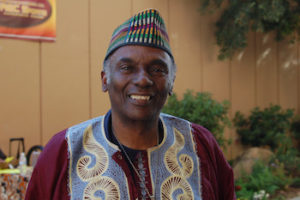
Leornard Jeffries Jr.
*Leonard Jeffries Jr. was born on this date in 1937. He is a Black educator and pan-Africanist.
He was born and raised in Newark, New Jersey. Jeffries attended Lafayette College for his undergraduate work. While in Lafayette, Jeffries pledged and was accepted into Pi Lambda Phi, a fraternity with many Jewish members. In his senior year, Jeffries was elected president of the fraternity. After graduating with honors in 1959, Jeffries won a Rotary International fellowship to the University of Lausanne in Switzerland and then returned in 1961 to study at Columbia University's School of International Affairs, from which he received a master's degree in 1965.
At the same time, Jeffries worked for Operation Crossroads Africa, allowing him to spend time in Guinea, Mali, Senegal, and the Ivory Coast. He became the program coordinator for West Africa in 1965. Jeffries became a political science instructor at CCNY in 1969 and received his doctorate from Columbia University in 1971 with a dissertation on politics in the Ivory Coast. He became the founding Chairman of Black Studies at San Jose State College in California. A year later, he became a tenured professor at CCNY and became the new chairman of the Black Studies Department.
He was Chairman of CCNY's Black Studies Department for over two decades, recruiting like-minded scholars and attempting to expand the number of faculty and students within or associated with the department. In 1972, he was recruited by the City College of New York to organize its Black Studies Department. During his tenure, the department sponsored/hosted/organized 25 major national and international conferences and seminars. Besides administration and teaching, he often traveled to Africa and served in the African Heritage Studies Association, a group seeking to define and develop the Black Studies discipline.
Jeffries was a speaker at college campuses and in public. He is known for his Pan-African Afro-centrist views on the role of African people in history and his opinion that the accomplishments of Blacks are far more critical than commonly held. Jeffries had also advanced a theory that whites are "ice people" who are violent and cruel, while Blacks are "sun people" who are compassionate and peaceful. He is a proponent of melanin theory and claims that melanin levels affect people's psyche and that melanin allows Black people to "negotiate the vibrations of the universe and to deal with the ultraviolet rays of the sun."
Known for his Pan-African Afrocentrist views that the role of African people in history and the accomplishments of African Americans are far more critical than commonly held, Jeffries has urged that public school syllabi be made less Euro-centric. His claims that Jewish businesspeople financed the Atlantic slave trade and used the movie industry to hurt Black people received national publicity in the early 1990s. Jeffries was discharged from his position as chairman of the Black Studies Department at CUNY, leading to a lengthy legal battle ending in the courts supporting the college's right to remove him due to his incendiary remarks.
In November 1994, the Supreme Court told the appeals court to reconsider after a related Supreme Court decision. The appeals court reversed its decision in April 1995, and in June of the same year, Prof. Moyibi Amodo was elected to succeed Jeffries as department chairman. The CUNY Institute for Research on the Diaspora in the Americas and Caribbean was created to do black research independent of Jeffries' department. It was headed by Edmund W. Gordon, who had led the Black Studies Department before Jeffries was reinstated.
The Jeffries case led to a debate about tenure, academic freedom, and free speech. He was sometimes compared to Michael Levin, a CUNY professor who, outside of the classroom, claimed that black people are inferior and had recently won against the school in court. One interpretation of the Jeffries case is that while a university cannot fire a professor for opinions and speech, they have more flexibility with a position like a department chair. Another is that it allows public institutions to discipline employees for disruptive speech. Jeffries' nephew, Hakeem Jeffries, has served in the US House of Representatives from New York.